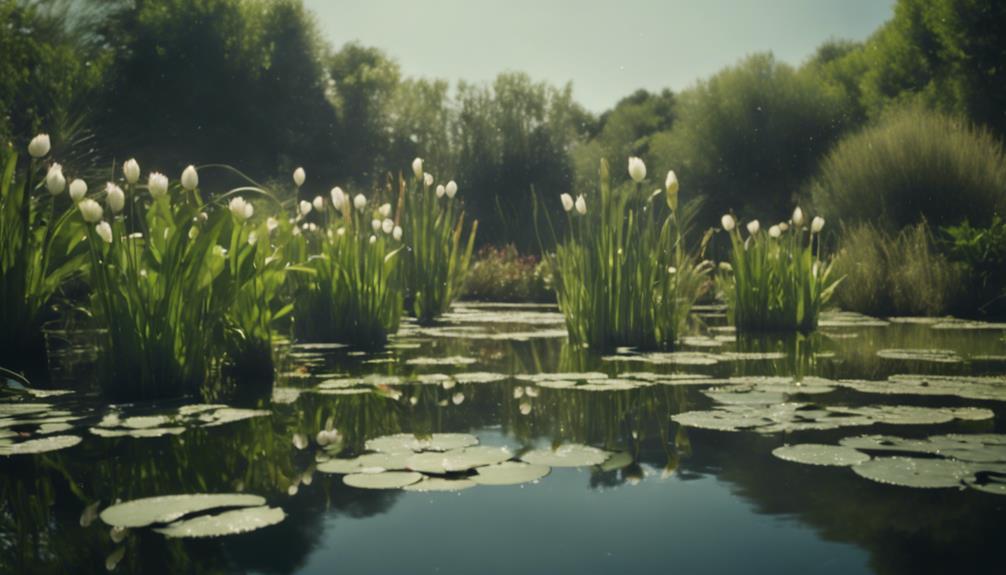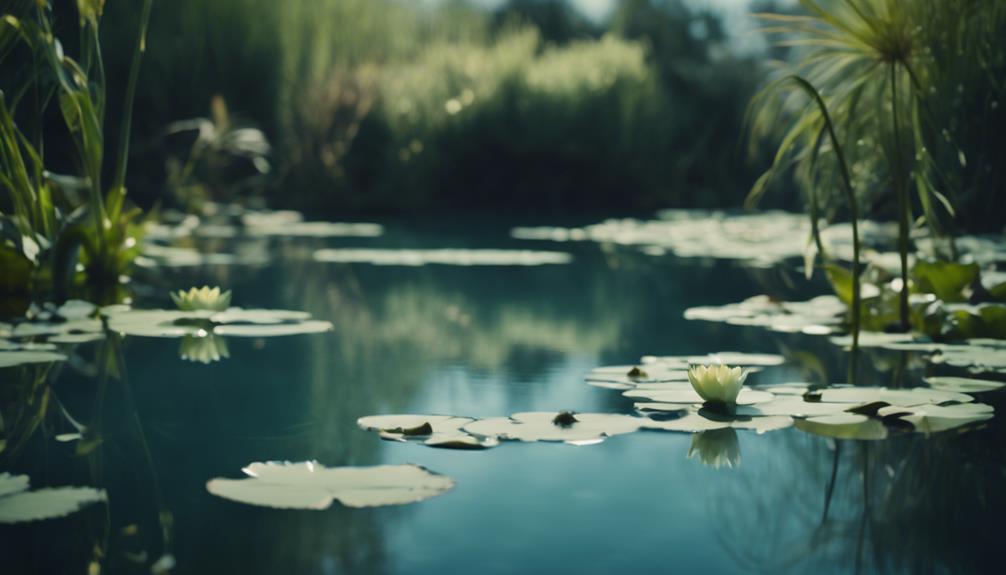You can control algae growth using three natural methods. First, utilize beneficial bacteria that consume excess nutrients, removing the primary food source for algae blooms. Second, introduce natural algae inhibitors like barley straw, citric acid, or vinegar, which create an environment that's not conducive to algae growth. Finally, incorporate pond plant solutions like water lilies, cattails, or irises, which absorb excess nutrients and block light, making it difficult for algae to thrive. By understanding these methods, you'll be well on your way to creating a balanced ecosystem that's free from algae blooms' negative impacts.
Table of Contents
Key Takeaways
- Beneficial bacteria combat algae growth by consuming excess nutrients, promoting a balanced ecosystem and healthy water quality.
- Natural algae inhibitors like barley straw, citric acid, and vinegar create an environment that isn't conducive to algae growth.
- Pond plants like water lilies, cattails, and floating plants absorb excess nutrients and block light, making it difficult for algae to thrive.
- Aerobic bacteria break down organic matter, reducing nutrient accumulation and organic sludge that contribute to algae growth.
- Introducing a variety of aquatic plants creates a balanced ecosystem that's less conducive to algae growth, providing a natural and environmentally friendly approach.
Utilizing Beneficial Bacteria
By introducing beneficial bacteria into your pond, you can harness the power of biological augmentation to substantially improve water quality and create a balanced ecosystem.
These naturally occurring microbes are specifically designed to combat algae growth by consuming excess nutrients, thereby removing the primary food source for algae blooms.
As a result, you'll notice a significant reduction in algae growth, leading to improved water quality and a more ecological balance.
Aerobic bacteria, in particular, play a vital role in breaking down organic matter, preventing algae overgrowth and creating a balanced ecosystem.
By dosing your pond with these beneficial microorganisms, you're boosting the natural populations, which helps to further reduce the accumulation of nutrients and organic sludge.
This, in turn, inhibits algae growth and promotes healthy water quality.
By utilizing beneficial bacteria, you're creating an environment where your pond can thrive, free from the negative impacts of algae blooms.
With these natural microbes on your side, you can rest assured that your pond is in good hands, enjoying a balanced ecosystem and crystal-clear water.
Natural Algae Inhibitors
In addition to utilizing beneficial bacteria, you can also employ natural algae inhibitors to further control algae growth in your pond.
These inhibitors are a great addition to your natural pond maintenance routine, helping you to naturally control algae growth without harming the environment.
One effective natural algae inhibitor is Barley straw, which releases compounds that inhibit algae growth when it decomposes.
Citric acid is another option, as it lowers the pH of the water, making it difficult for algae to thrive.
Vinegar is also a viable solution, as its acidity creates an environment that isn't conducive to algae growth.
If you're looking for a non-chemical solution, UV light is a great option, as it inhibits photosynthesis, making it difficult for algae to thrive.
Finally, lanthanum-modified clay is a natural algae inhibitor that permanently removes phosphorus from the water column, making it difficult for algae to grow.
Pond Plant Solutions

You can also harness the power of aquatic plants to control algae growth in your pond, as they compete with algae for resources like light, nutrients, and space.
By incorporating pond plants into your pond's ecosystem, you can help control algae naturally. Water lilies, for instance, are excellent at absorbing excess nutrients that algae need to thrive.
Marginal plants, such as cattails and irises, can also help reduce algae growth by providing shade and consuming nutrients.
Floating plants like water hyacinth and duckweed are equally effective, as they absorb nutrients and block light, making it difficult for algae to grow.
By introducing a variety of aquatic plants to your pond, you'll be creating a balanced ecosystem that's less conducive to algae growth.
This natural approach to controlling algae isn't only effective but also environmentally friendly.
Frequently Asked Questions
How Do You Stop Algae From Growing Naturally?
You prevent algae growth naturally by maintaining ideal water parameters, incorporating aquatic plants, and ensuring proper water circulation, sunlight reduction, and nutrient control, while also introducing algae eaters and practicing sediment removal to achieve a balanced ecosystem.
What Is the Best Method to Control Algae?
To control algae, you'll want to identify the underlying cause, as it's often linked to an imbalance in ecological balance, excessive nutrient levels, or specific environmental factors, which can trigger algae blooms and disrupt water clarity.
What Natural Remedy Kills Algae?
You'll find that hydrogen peroxide treatment, barley straw extract, and UV light therapy are effective natural remedies that kill algae, while also considering algae eating fish, algae consuming bacteria, and natural algae predators for a holistic approach.
How to Naturally Prevent Algae in a Pond?
You're about to reveal the secret to a crystal-clear pond, and it's not rocket science! To naturally prevent algae in your pond, you must maintain pond aeration, guarantee water clarity, and balance eco-friendly practices to prevent algae blooms, supporting a thriving aquatic life and pond ecosystem.
Conclusion
You've taken the first step in tackling the pesky algae problem.
Now, it's time to 'get down to brass tacks' and implement these natural methods.
By utilizing beneficial bacteria, natural inhibitors, and pond plant solutions, you'll be well on your way to a balanced ecosystem.
Remember, controlling algae growth is an ongoing process that requires patience and persistence.
With these methods, you'll be swimming in clear waters in no time.

